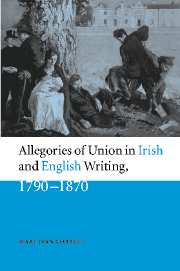 Allegories of Union in Irish and English Writing, 1790–1870
Allegories of Union in Irish and English Writing, 1790–1870 Book contents
- Frontmatter
- Contents
- Acknowledgments
- Introduction
- Chapter One Public affections and familial politics: Burke, Edgeworth, and Ireland in the 1790s
- Chapter Two Allegories of prescription: engendering Union in Owenson and Edgeworth
- Chapter Three Troubling others: representing the immigrant Irish in urban England around mid-century
- Chapter Four Plotting colonial authority: Trollope's Ireland, 1845–1860
- Chapter Five England's opportunity, England's character: Arnold, Mill, and the Union in the 1860s
- Afterword
- Notes
- Bibliography
- Index
Chapter Five - England's opportunity, England's character: Arnold, Mill, and the Union in the 1860s
Published online by Cambridge University Press: 22 September 2009
- Frontmatter
- Contents
- Acknowledgments
- Introduction
- Chapter One Public affections and familial politics: Burke, Edgeworth, and Ireland in the 1790s
- Chapter Two Allegories of prescription: engendering Union in Owenson and Edgeworth
- Chapter Three Troubling others: representing the immigrant Irish in urban England around mid-century
- Chapter Four Plotting colonial authority: Trollope's Ireland, 1845–1860
- Chapter Five England's opportunity, England's character: Arnold, Mill, and the Union in the 1860s
- Afterword
- Notes
- Bibliography
- Index
Summary
“We are married to Ireland by the ground-plan of this world – a thick-skinned labouring man to a drunken ill-tongued wife, and dreadful family quarrels have ensued”: so wrote Thomas Carlyle to the Irish nationalist Charles Gavan Duffy in 1847, wrenching the Union-as-marriage metaphor in a manner that Edgeworth and Owenson could neither have anticipated nor approved. Such an understanding of the marital as of the imperial bond – as naturally ordained, but also as violently contested – was itself to become the norm in the ensuing decades, testifying to a shift in the social and ideological pressures exerted on each of these fictions of consent. If marriage naturalized and institutionalized gender inequality, the basis for that inequality was increasingly disputed in some arenas, and every bit as persistently justied in others. As in contemporary debates on the politics of marriage, so, too, did the politics of Union undergo a series of challenges – from Irish liberation movements, but also from English liberal thinkers – that seriously tested the assumptions on which English rule in Ireland had been based.
In Trollope's Phineas Finn (1869), a bad marriage provides the explicit model for the unhappy union of England and Ireland, as it manifests itself in the conflict over tenant-right that ultimately leads the eponymous Irish catholic M.P. to vote against his party and so to lose his seat.
- Type
- Chapter
- Information
- Allegories of Union in Irish and English Writing, 1790–1870Politics, History, and the Family from Edgeworth to Arnold, pp. 148 - 181Publisher: Cambridge University PressPrint publication year: 2000


